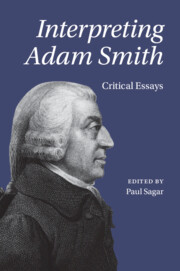Book contents
- Interpreting Adam Smith
- Interpreting Adam Smith
- Copyright page
- Contents
- Contributors
- Acknowledgements
- Abbreviations of Works by Adam Smith
- Introduction
- 1 Smith Scholarship
- 2 The Wealth of Nations as a Work of Social Science
- 3 Adam Smith’s “Industrial Organization” of Religion
- 4 Talking to My Butcher
- 5 What Did Adam Smith Mean? The Semantics of the Opening Key Principles in the Wealth of Nations
- 6 Adam Smith and Virtuous Business
- 7 Adam Smith and the Morality of Political Economy
- 8 A Moral Philosophy for Commercial Society?
- 9 Adam Smith, Sufficientarian
- 10 Narrowing the Scope of Resentment in Smith’s Theory of Moral Sentiments
- 11 Adam Smith
- 12 “Much Better Instructors”
- 13 Sophie de Grouchy as an Activist Interpreter of Adam Smith
- 14 Adam Smith and the Limits of Philosophy
- Bibliography
- Index
14 - Adam Smith and the Limits of Philosophy
Published online by Cambridge University Press: 14 September 2023
- Interpreting Adam Smith
- Interpreting Adam Smith
- Copyright page
- Contents
- Contributors
- Acknowledgements
- Abbreviations of Works by Adam Smith
- Introduction
- 1 Smith Scholarship
- 2 The Wealth of Nations as a Work of Social Science
- 3 Adam Smith’s “Industrial Organization” of Religion
- 4 Talking to My Butcher
- 5 What Did Adam Smith Mean? The Semantics of the Opening Key Principles in the Wealth of Nations
- 6 Adam Smith and Virtuous Business
- 7 Adam Smith and the Morality of Political Economy
- 8 A Moral Philosophy for Commercial Society?
- 9 Adam Smith, Sufficientarian
- 10 Narrowing the Scope of Resentment in Smith’s Theory of Moral Sentiments
- 11 Adam Smith
- 12 “Much Better Instructors”
- 13 Sophie de Grouchy as an Activist Interpreter of Adam Smith
- 14 Adam Smith and the Limits of Philosophy
- Bibliography
- Index
Summary
The last Fifty years have witnessed the rediscovery of Adam Smith’s moral philosophy and an increasing exploration of his conception of himself as a moral philosopher. Recent scholarship has dwelt on the eclectic nature of this thinking. Scholars have suggested that Smith draws on and combines elements drawn from across the ancient and modern schools of philosophy, and that the moral philosophy of the Scottish Enlightenment is characterised by an awareness of and response to the fact of moral pluralism. This leaves open the possibility that different modes of moral thinking can issue in incommensurable conclusions: that in some cases there might be no way to decide what is the ‘right’ thing to do. I explore the implications of these readings for Smith’s understanding of the role of philosophy in moral decision-making and, more particularly, what this means for teaching moral philosophy. Smith saw philosophy as a specific and limited activity that formed but a small part of the moral life of the individual. Moreover, Smith cautioned against over-ambition in philosophical thinking and warned of the intellectual, social, and political dangers of too much philosophy.
- Type
- Chapter
- Information
- Interpreting Adam SmithCritical Essays, pp. 232 - 244Publisher: Cambridge University PressPrint publication year: 2023

